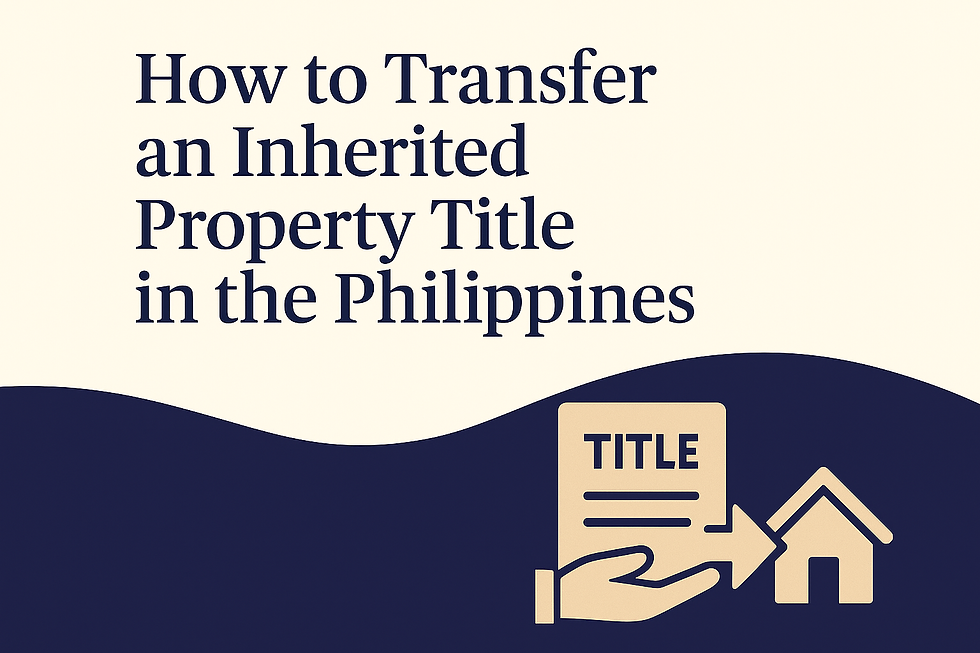How to File Estate Tax Amnesty in the Philippines (RA 11956 Extension 2025)
- cristino rosales
- Mar 1, 2025
- 3 min read
If your family has an inherited property — and the estate taxes haven’t been settled yet — here’s some good news: you may still qualify for the Estate Tax Amnesty program. The latest law, Republic Act No. 11956 (RA 11956), extends the window and coverage. Let’s walk through what you need to know, how to apply, and what the benefits are, all in plain talk.
Why This Matters
Many estates remain unsettled in the Philippines because the penalties, interest, and legal costs mount over time. The amnesty is designed to give heirs a cleaner path:
A flat tax rate (instead of mounting surcharges)
Waiver of penalties and interest for eligible estates
The chance to finally transfer titles, access bank assets, or use inherited property as collateral.

What the Law Covers — RA 11956 at a Glance
Here are the key features:
It amends the original Republic Act No. 11213 (Tax Amnesty Act) as previously extended by Republic Act No. 11569. Lawphil+1
The period to file and pay under the amnesty runs from June 15, 2023 to June 14, 2025. PwC+1
The “cut-off” for eligible decedents is those who died on or before May 31, 2022 (and whose estate taxes remained unpaid or accrued as of that date). filedocsphil.com+2arceotandoc+2
Estates that successfully avail get immunity from further estate tax (for that covered period) and from associated civil/administrative liabilities. Lawphil+1
How Much Tax?
Under the amnesty you still compute on the net estate (after allowable deductions) at a flat rate of 6%. PwC
Minimum tax: Even if the net estate is small, the law sets a floor (e.g., ₱5,000) for the amnesty tax. CDIT Law Offices+1
Important: No penalties, surcharges or interest apply for those covered and validly availed. Bir CDN+1
Step-by-Step: How to File Here’s a simplified guide you can follow:
Step 1: Check Eligibility
Did the decedent die on or before May 31, 2022?
Are the estate taxes still unpaid or accrued as of that date?
Are there no disqualifying cases (e.g., tax evasion, money-laundering, etc.)?
Step 2: Gather Required Documents
Mandatory requirements under RA 11956 (and its implementing rules) include:
Certified true copy of the Death Certificate (or certificate of no record of death + valid secondary evidence) arceotandoc+1
Taxpayer Identification Numbers (TINs) of decedent and heirs Grant Thornton Philippines+1
Valid ID of executor/administrator or heirs/authorized representative PwC
If there are “claims against the estate” (like loans) then a notarized promissory note National Tax Research Center
For real property, certified true copies of the titles, tax declarations, etc. arceotandoc
Step 3: Compute the Tax
Determine gross estate value, subtract allowable deductions (standard deduction, family home deduction, etc.) → net estate.
Multiply net estate by 6% → this is your amnesty tax.
Make sure you keep all computation sheets, proof of valuations, etc.
Step 4: File the Return & Pay
File the Estate Tax Amnesty Return (ETAR) using the prescribed form (e.g., BIR Form No. 2118-EA) for the estate. filedocsphil.com
Pay the amnesty tax at an authorized agent bank (AAB), Revenue District Office (RDO) or authorized tax software provider. National Tax Research Center
After payment, submit the return + acceptance payment form + documents to the RDO (in triplicate) within the filing window.
Step 5: Obtain Certificate Authorizing Registration (eCAR)
Once the BIR confirms everything, they issue an eCAR. Without this, you cannot transfer titles, register shares, or release bank assets. acpapp+1
What Happens If You Miss the Deadline?
If you fail to file/pay by June 14, 2025 (the amnesty deadline), your estate will no longer qualify for the reduced treatment.
The regular rules apply: the rate of 6% (or earlier higher rates depending on date of death), plus interest (12% p.a.) and surcharges (25% or higher). hubbis.com
Titles may remain frozen, bank deposits may not be released, and heirs may face heavier liabilities.
Bonus Tips for Heirs
Even if you haven’t done the extrajudicial settlement or division yet, you can still file and pay first, then submit the settlement later (before eCAR issuance). SunStar Publishing Inc.
Make sure property valuations use the correct basis: e.g., for real property use the higher of zonal value or fair market value at date of death.
Keep originals and certified copies of all documents — estates covered under amnesty may be subject to audit if documents are missing.
Final Thoughts
This amnesty is your window — a real chance to finally settle that inherited property, unlock its value, and move forward without the drag of past tax burdens. But remember it’s time sensitive.
“When an inheritance sits idle, its potential also sits idle. Clear the path — and let the next generation move.”
Author's Note
Written by Cris Rosales Jr., founder of A Little Bit of Everything in Life — your go-to place for real estate, investing and practical living in the Philippines.



Comments